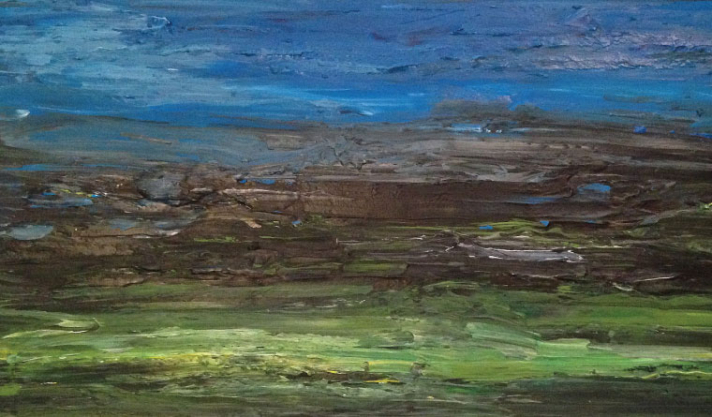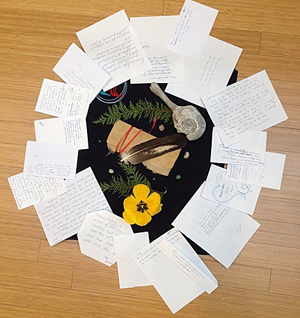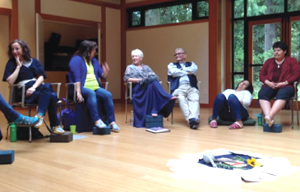
Painting: Kenda Thomson-Burgis
Bright hope for the future of reconciliation in Canada has stirred and bloomed for Wanda Brascoupé Peters, and when asked what’s next for this work, she answers with vivacity, “Blue sky.”
The source of this fresh hope springs from the inspiration of a gathering Wanda joined along with about 18 other people to discover and begin to live into the full possibilities in reconciliation leadership.
Called the Reconciliation Leadership Learning Experience (RLLE), the first-of-its-kind pilot program was hosted by Reconciliation Canada in partnership with the Academy for Systemic Change.
|
Image

|
|
“The gift I’ve received is that I really think we can achieve reconciliation quicker than we’ve believed,” says Wanda, who joined the experience as a strongly rooted Indigenous woman. Wanda is also executive director of The Circle on Philanthropy and Aboriginal Peoples in Canada, a network of funders and charitable organizations that are Indigenous.
The Gift of Calming
The first component of RLLE centres on self-reflection around one’s own reconciliation path. As Wanda draws on her memory of the vision of others at the RLLE gathering, including that of reconciliation visionary Chief Dr. Robert Joseph, as well as the energy of deep connection with people that had been strangers prior, she has been experiencing a calm and even joy.
“It’s not one of those daunting things like oh, gosh, something else I need to do,” Wanda says.
“It’s far more calming, actually. There’s joy in it and there’s uncomfortableness in it. But there is a calmness about it that I’ve really found is beneficial.”
The Gift of Discomfort
| “We just allowed our humanness to come through and accepted each other’s truth.” | |
A nourishing gift Wanda also received is the confirmation that discomfort is natural and even necessary in the work of reconciliation.
“If you’re willing to be uncomfortable in a kind way you can move things forward,” Wanda says, noting that during the gathering there was a willingness to be uncomfortable in a respectful manner as people brought forward their sometimes sensitive, sometimes negative stories and perspectives.
“We just allowed our humanness to come through and accepted each other’s truth.”
The English Language is a ‘Speed-bump’
In the creating the conditions for reconciliation to flourish, the English is a real speed bump, Wanda believes.
Raised by a family that spoke English but whose first languages were Indigenous, Wanda brings a deep understanding of what it means to spend one’s whole life “translating from what you really mean.”
Examples of the nuances in meaning include what one means when one says “our land.” Is it “land that we own” or “land that is basically talking about your mother, about what the land does for you and how you respond to it?”
|
Image

|
|
“Just that small (term) — our land — keeps us worlds apart,” Wanda says.
The understanding of the term “good ancestor” and how that plays out in a person’s life and work is another example. How one approaches every task, every decision, can be shaped by the question, “Am I being a good ancestor through this? Am I thinking of future generations?”
“I really feel as though the English language is our greatest speed bump,” says Wanda, who is dedicated to creating a better understanding of the nuances. A June 23 webinar, hosted by The Circle and philanthropic partners, titled “I Don’t Want to Say the Wrong Thing! Shedding Light on Language,” is intended to help foster that understanding.
An Amazing Opportunity
Looking ahead, Wanda feels excited as she considers the significant opportunity that is present for Canada to step up as a model and leader in reconciliation.
| “The citizens of this country have the opportunity to be the citizens that they think they are.” | |
“The citizens of this country have the opportunity to be the citizens that they think they are,” she says. “Wow, that’s pretty amazing.”
A new initiative of Reconciliation Canada, the RLLE is considered to be still in the prototype phase. The design will continue to be refined moving forward.
Reconciliation Canada was born from the vision of Chief Dr. Robert Joseph, Gwawaenuk Elder, to revitalize relationships among Indigenous peoples and all Canadians through open and honest dialogue and transformative experiences.
Reconciliation Canada is hosting a series of events to move the reconciliation dialogue forward across the country throughout 2016.
To learn more about:
Reconciliation Canada, visit www.reconciliationcanada.ca.
The Academy for Systemic Change, visit www.academyforchange.org.
The Circle on Philanthropy and Aboriginal Peoples in Canada, visit www.philanthropyandaboriginalpeoples.ca.
Related Story:
A Journey of Discovery into Reconciliation Ignites Deeply-felt Change
You can comment on this story below, or e-mail michelle(at)axiomnews.com.






Reconciliation in Canada
This article could have been enlarged dramatically if Michelle had also discussed reconciliation from the Settler perspective, which means that those of us who belong to the dominant society need to face the truth of colonialism without denial, to understand how we have been complicit with such a genocidal system, to take responsibility for our white privilege, to assist First Nations as allies and in solidarity with their struggles for basic human rights and soverignty, to develop better intercultural competency skills, and to work to deconstruct the colonization in ourselves and undo the racism in our society. It takes both parties to reconcile, and there will never be reconciliation in Canada if white people don't do our share of the work.